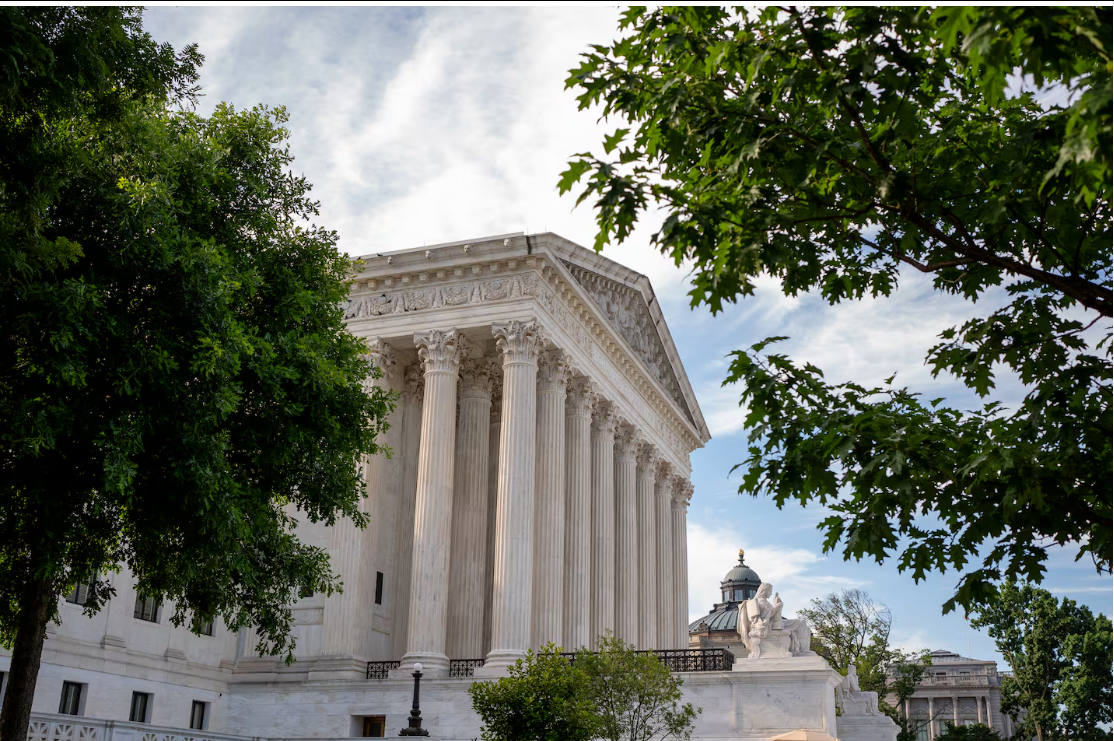美国最高法院维持旨在保护家庭暴力受害者的枪支管制法

【中美创新时报2024 年 6 月 22 日编译讯】(记者温友平编译)美国最高法院周五(21日)维持了旨在保护家庭暴力受害者的联邦枪支管制法。美联社记者马克·谢尔曼(MARK SHERMAN)对此作了下述报道。
自 2022 年扩大枪支权利以来,这是他们首次提起第二修正案案件,法官以 8-1 的投票结果支持 1994 年禁止持有枪支的禁令,禁止受限制令约束的人远离配偶或伴侣。法官推翻了新奥尔良联邦上诉法院推翻该法律的裁决。
首席大法官约翰·罗伯茨代表法院撰文称,该法律使用“常识”,并且仅在“法官确定个人构成可信的”身体暴力威胁后才适用。
克拉伦斯·托马斯大法官是 2022 年纽约案件中布鲁恩裁决的作者,他对此表示反对。
总统乔·拜登一直批评最高法院之前关于枪支、堕胎和其他热点问题的裁决,他对这一结果表示赞赏。
拜登在一份声明中说:“任何受虐待的人都不应该担心施虐者会拿到枪。” “由于今天的裁决,家庭暴力的幸存者及其家人仍然能够像过去三十年一样获得关键的保护。”
上周,法院推翻了特朗普时代对撞火枪托的禁令,撞火枪托是美国现代史上最致命的大规模枪击案中使用的速射枪配件。法院裁定司法部在实施该禁令时超越了其权限。
周五的案件直接源于最高法院 2022 年 6 月对布鲁恩案的裁决。一名德克萨斯州男子扎基·拉希米 (Zackey Rahimi) 被指控在停车场争吵时殴打女友,后来威胁要枪杀她。
在 11 月的辩论中,一些法官表示担心,对拉希米有利的裁决也可能危及背景调查系统,拜登政府表示,该系统在过去 25 年中根据家庭暴力保护令已停止了 75,000 多起枪支销售。
该案还受到密切关注,因为它可能会影响其他枪支所有权法律受到质疑的案件,包括备受瞩目的亨特·拜登 (Hunter Biden) 的起诉。拜登的儿子因在吸毒期间在购买枪支的表格上撒谎而被定罪。他的律师表示他们将提出上诉。
废除家庭暴力枪支法的决定可能也表明法院对其他法律持怀疑态度。但周五的裁决也并不意味着法院一定会支持这些法律。
法官们可能很快就会对其中一个或多个案件发表意见。
许多枪支法律案件都源于布鲁恩案的裁决。最高法院的这项裁决不仅扩大了美国人在宪法下的枪支权利,还改变了法院评估枪支限制的方式。
罗伯茨在意见书中回顾了历史。他写道:“自建国以来,我们国家的枪支法律就包括禁止威胁他人身体伤害的个人滥用枪支的条款。”
罗伯茨写道,一些法院在适用布鲁恩案和其他枪支权利案件时做得太过了。他写道:“这些先例并不意味着法律被困在琥珀中。”
托马斯在异议中写道,该法律“剥夺了个人在未经任何正当程序的情况下持有枪支和弹药的能力。”
他写道,政府“未能提供任何证据”证明该法律符合该国枪支管制的历史传统。
“没有一条历史法规可以证明该法规的合理性,”托马斯写道。
九名法官中有七名在枪支案中发表了长达 94 页的意见,主要集中在如何正确使用历史来评估枪支限制和其他宪法权利限制。
索尼娅·索托马约尔大法官写道,罗伯茨的意见“允许进行经过校准的历史调查,以揭示一些有用且可转移到当今的东西,而反对意见会使历史调查过于严格而变得毫无用处。”她是三位对布鲁恩案持不同意见的自由派法官之一。
布鲁恩多数派大法官布雷特·卡瓦诺指出,法院可能会有更多关于枪支权利范围的案件,因为“第二修正案法理学正处于早期阶段。”直到 2008 年,法院才首次宣布宪法保护个人持有和携带武器的权利。
拉希米的案件在检察官上诉一项裁决后进入最高法院,该裁决推翻了他在受到限制令约束期间持有枪支的定罪。
美国巡回法官科里·威尔逊指出,拉希米在两个月内参与了德克萨斯州阿灵顿及其周边地区的五起枪击案。威尔逊写道,当警方将拉希米认定为枪击案嫌疑人并持搜查令来到他家时,他承认家中有枪,并受到禁止持有枪支的家庭暴力限制令的约束。
但即使拉希米很难算得上“模范公民”,威尔逊写道,但从历史来看,相关法律也无法得到证实。这是托马斯大法官在布鲁恩案中为法庭提出的测试。
上诉法院最初根据一项平衡测试维持了原判,其中包括限制是否加强了公共安全。但布鲁恩案之后,陪审团改变了方向。自布鲁恩案判决以来,至少有一个地区法院维持了该法律。
在裁决之后,司法部长梅里克·加兰德表示,司法部“将继续执行这项重要法规,近 30 年来,该法规一直帮助保护家庭暴力受害者和幸存者免受虐待者的侵害。”
“正如司法部所辩称的,以及法院今天重申的,这一常识性禁令完全符合法院的先例以及《第二修正案》的文本和历史,”加兰在一份声明中说。
家庭暴力受害者的倡导者和枪支管制组织呼吁法院维护法律。
根据联邦疾病控制和预防中心的数据,枪支是近年来配偶、亲密伴侣、子女或亲属被杀案中最常用的武器。 2020 年,超过一半(57%)的杀人案使用了枪支,而这一年在冠状病毒大流行期间家庭暴力事件总体增加。
根据枪支管制组织 Everytown for Gun Safety 的数据,平均每月有 70 名女性被亲密伴侣枪杀。
枪支权利组织支持拉希米,认为上诉法院在审视美国历史时做出了正确的判断,没有发现任何足以证明枪支禁令合理的限制。
美联社记者法蒂玛·侯赛因、阿兰娜·杜尔金·里彻和林赛·怀特赫斯特对本报告做出了贡献。
题图:最高法院。ANDREW HARNIK/GETTY
附原英文报道:
Supreme Court upholds a gun control law intended to protect domestic violence victims
By MARK SHERMAN The Associated Press,Updated June 21, 2024,
WASHINGTON (AP) — The Supreme Court on Friday upheld a federal gun control law that is intended to protect victims of domestic violence.
In their first Second Amendment case since they expanded gun rights in 2022, the justices ruled 8-1 in favor of a 1994 ban on firearms for people under restraining orders to stay away from their spouses or partners. The justices reversed a ruling from the federal appeals court in New Orleans that had struck down the law.
Chief Justice John Roberts, writing for the court, said the law uses “common sense” and applies only “after a judge determines that an individual poses a credible threat” of physical violence.
Justice Clarence Thomas, the author of the major 2022 Bruen ruling in a New York case, dissented.
President Joe Biden, who has been critical of previous high-court rulings on guns, abortion and other hot-button issues, praised the outcome.
“No one who has been abused should have to worry about their abuser getting a gun,” Biden said in a statement. “As a result of today’s ruling, survivors of domestic violence and their families will still be able to count on critical protections, just as they have for the past three decades.”
Last week, the court overturned a Trump-era ban on bump stocks, the rapid-fire gun accessories used in the deadliest mass shooting in modern U.S. history. The court ruled that the Justice Department exceeded its authority in imposing that ban.
Friday’s case stemmed directly from the Supreme Court’s Bruen decision in June 2022. A Texas man, Zackey Rahimi, was accused of hitting his girlfriend during an argument in a parking lot and later threatening to shoot her.
At arguments in November, some justices voiced concern that a ruling for Rahimi could also jeopardize the background check system that the Biden administration said has stopped more than 75,000 gun sales in the past 25 years based on domestic violence protective orders.
The case also had been closely watched for its potential to affect cases in which other gun ownership laws have been called into question, including in the high-profile prosecution of Hunter Biden. Biden’s son was convicted of lying on a form to buy a firearm while he was addicted to drugs. His lawyers have signaled they will appeal.
A decision to strike down the domestic violence gun law might have signaled the court’s skepticism of the other laws as well. But Friday’s decision did not suggest that the court would necessarily uphold those law either.
The justices could weigh in soon in one or more of those other cases.
Many of the gun law cases grow out of the Bruen decision. That high court ruling not only expanded Americans’ gun rights under the Constitution but also changed the way courts are supposed to evaluate restrictions on firearms.
Roberts turned to history in his opinion. “Since the founding, our nation’s firearm laws have included provisions preventing individuals who threaten physical harm to others from misusing firearms,” he wrote.
Some courts have gone too far, Roberts wrote, in applying Bruen and other gun rights cases. “These precedents were not meant to suggest a law trapped in amber,” he wrote.
In dissent, Thomas wrote, the law “strips an individual of his ability to possess firearms and ammunition without any due process.”
The government “failed to produce any evidence” that the law is consistent with the nation’s historical tradition of firearm regulation, he wrote.
“Not a single historical regulation justifies the statute at issue,” Thomas wrote.
Seven of the nine justices wrote opinions in the guns case spanning 94 pages, mainly focused on the proper use of history in evaluating gun restrictions and other limitations on constitutional rights.
Justice Sonia Sotomayor wrote that Roberts’ opinion “permits a historical inquiry calibrated to reveal something useful and transferable to the present day, while the dissent would make the historical inquiry so exacting as to be useless.” She was among the three liberal justices who dissented in the Bruen case.
Justice Brett Kavanaugh, who was part of the Bruen majority, noted that the court probably will have many more cases about the reach of gun rights because “Second Amendment jurisprudence is in its early innings.” It was only in 2008 that the court declared for the first time that the Constitution protects an individual’s right to keep and bear arms.
Rahimi’s case reached the Supreme Court after prosecutors appealed a ruling that threw out his conviction for possessing guns while subject to a restraining order.
Rahimi was involved in five shootings over two months in and around Arlington, Texas, U.S. Circuit Judge Cory Wilson noted. When police identified Rahimi as a suspect in the shootings and showed up at his home with a search warrant, he admitted having guns in the house and being subject to a domestic violence restraining order that prohibited gun possession, Wilson wrote.
But even though Rahimi was hardly “a model citizen,” Wilson wrote, the law at issue could not be justified by looking to history. That’s the test Justice Thomas laid out in his opinion for the court in Bruen.
The appeals court initially upheld the conviction under a balancing test that included whether the restriction enhances public safety. But the panel reversed course after Bruen. At least one district court has upheld the law since the Bruen decision.
After the ruling, Attorney General Merrick Garland said the Justice Department “will continue to enforce this important statute, which for nearly 30 years has helped to protect victims and survivors of domestic violence from their abusers.”
“As the Justice Department argued, and as the Court reaffirmed today, that commonsense prohibition is entirely consistent with the Court’s precedent and the text and history of the Second Amendment,” Garland said in a statement.
Advocates for domestic violence victims and gun control groups had called on the court to uphold the law.
Firearms are the most common weapon used in homicides of spouses, intimate partners, children or relatives in recent years, according to data from the federal Centers for Disease Control and Prevention. Guns were used in more than half, 57%, of those killings in 2020, a year that saw an overall increase in domestic violence during the coronavirus pandemic.
Seventy women a month, on average, are shot and killed by intimate partners, according to the gun control group Everytown for Gun Safety.
Gun rights groups backed Rahimi, arguing that the appeals court got it right when it looked at American history and found no restriction close enough to justify the gun ban.
Associated Press writers Fatima Hussein, Alanna Durkin Richer and Lindsay Whitehurst contributed to this report.

